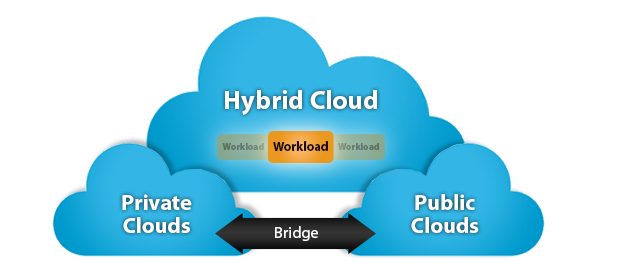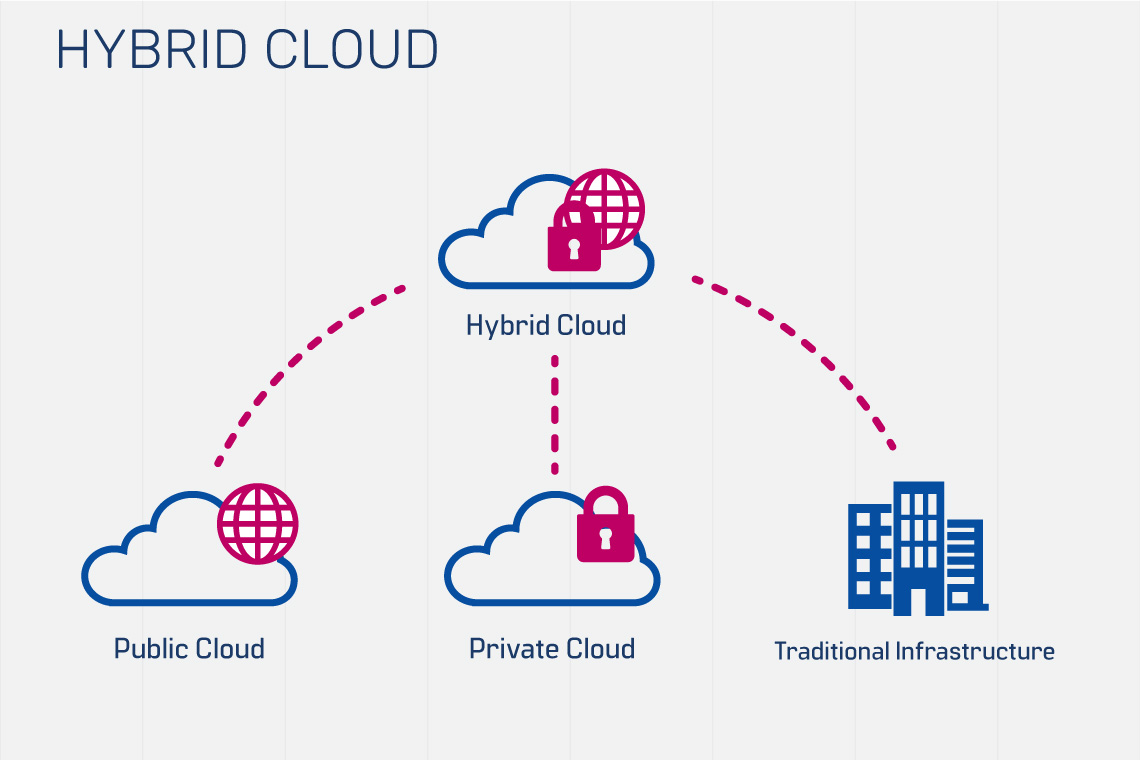Cloud computing and hybrid cloud environments offer numerous benefits for businesses. They provide flexibility, scalability, and cost-efficiency, allowing organizations to easily scale their resources based on their needs. With cloud computing, businesses can access their data and applications from anywhere, enabling remote work and collaboration. Hybrid cloud environments combine the best of both worlds, offering the advantages of both public and private clouds. This allows businesses to balance their workload between the two and ensure optimal performance and security. Overall, understanding the benefits of cloud computing in hybrid cloud environments is crucial for modern businesses.
Cloud computing has revolutionized the way businesses operate, making data storage and accessibility more efficient and flexible. But have you ever wondered about the benefits of combining cloud computing with a hybrid cloud environment? This unique setup offers the best of both worlds, allowing organizations to leverage the advantages of public and private clouds. It’s a fascinating concept that brings enhanced scalability, security, and cost-effectiveness to the table.
Understanding the benefits of cloud computing in hybrid cloud environments involves delving into its history and why it has become such a popular solution for businesses. With the rise of cloud computing, organizations have been able to reduce costs, improve productivity, and streamline operations. However, there can be concerns about security and control when solely relying on public clouds or on-premises infrastructure. Hybrid cloud environments offer a solution by allowing companies to retain control over critical data and applications while still capitalizing on the scalability and cost savings of the public cloud. In fact, studies have shown that organizations utilizing hybrid cloud environments can experience an average 40% reduction in operational costs.

Cloud computing has revolutionized the way businesses operate, offering numerous benefits such as scalability, cost-efficiency, and flexibility. One of the key developments in the world of cloud computing is the emergence of hybrid cloud environments. Hybrid cloud combines the advantages of public and private clouds, allowing organizations to leverage the benefits of both deployments. In this article, we will explore the benefits of cloud computing in hybrid cloud environments and how they can enhance the operations and success of businesses. But before diving into the details, let’s understand what hybrid cloud is and how it differs from public and private clouds.
Understanding Hybrid Cloud Environments
Hybrid cloud refers to the combination of two or more cloud environments, usually a combination of a public cloud provided by a third-party service provider and a private cloud deployed within an organization’s premises. The key characteristic of hybrid cloud is the ability to seamlessly integrate and manage applications, data, and workloads between the public and private cloud components. This integration can be achieved through various technologies such as virtual private networks (VPNs), dedicated connections, or hybrid cloud management platforms.
The public cloud component of a hybrid cloud is typically used for non-sensitive data, applications with fluctuating workloads, or for testing and development purposes. On the other hand, the private cloud component provides greater control, security, and performance for sensitive data and critical applications. By combining these two environments, organizations can leverage the benefits of both public and private clouds, optimizing their operations and achieving greater efficiency.
Benefits of Hybrid Cloud Environments
Hybrid cloud environments offer several benefits that make them an attractive option for organizations. Let’s explore some of these benefits:
1. Flexibility and Scalability
One of the significant advantages of hybrid cloud environments is the flexibility and scalability they provide. Organizations can dynamically allocate workloads and resources based on their needs. For example, during periods of peak demand, applications and data can be scaled up using the resources of the public cloud. On the other hand, during periods of low demand, organizations can scale down and optimize costs by utilizing the private cloud. This flexibility allows businesses to adapt quickly to changing market conditions and efficiently manage their IT infrastructure.
Moreover, hybrid cloud makes it easier to handle sudden bursts of traffic or spikes in demand. By offloading part of the workload to the public cloud, organizations can ensure that their systems remain responsive and can handle the increased load. This scalability and flexibility of hybrid cloud environments enable businesses to achieve better performance and user experience.
2. Cost Efficiency
Another key benefit of hybrid cloud environments is cost efficiency. By using a combination of public and private clouds, organizations can optimize their IT spending. In the private cloud, businesses can host critical and sensitive applications that require high levels of security and compliance. On the other hand, non-sensitive applications or those with fluctuating workloads can be hosted in the public cloud, where the pay-as-you-go model allows for cost optimization.
Additionally, the ability to scale resources up or down based on demand ensures that businesses only pay for what they need, eliminating the need for over-provisioning. This cost optimization is particularly beneficial for small and medium-sized enterprises (SMEs) that may have limited IT budgets but still require the benefits of cloud computing.
3. Enhanced Security and Compliance
Security is a top concern when it comes to cloud computing, especially for organizations handling sensitive data or operating in regulated industries. Hybrid cloud environments offer enhanced security and compliance capabilities by allowing organizations to keep their critical data and applications within the private cloud, which can be subject to stricter security measures and regulations.
Furthermore, businesses can utilize encryption, access controls, and other security measures to protect their data, both in transit and at rest. With the ability to choose where their data resides, organizations have greater control over its security and can ensure compliance with industry-specific regulations and data protection laws.
4. Disaster Recovery and Business Continuity
Hybrid cloud environments provide robust disaster recovery and business continuity capabilities. By storing critical data and applications in the private cloud, organizations have greater control over backups, replication, and failover mechanisms. In the event of a disaster or system failure, organizations can quickly and efficiently restore operations using the replicated data and failover capabilities of the hybrid cloud.
In addition, the public cloud component of hybrid cloud environments can act as a backup or secondary site for disaster recovery purposes. By replicating data to the public cloud, businesses can ensure that their data is safe and accessible even if the private cloud infrastructure is compromised.
5. Improved Performance and Latency
Hybrid cloud environments can help improve performance and reduce latency by allowing organizations to host critical applications and data closer to their users or customers. By leveraging the globally distributed infrastructure of public cloud providers, organizations can deploy resources in various geographical regions, ensuring that their services are available and responsive to users around the world.
For example, organizations operating e-commerce platforms can utilize the public cloud’s Content Delivery Network (CDN) capabilities to cache and serve static content closer to end-users, reducing latency and improving website performance. This ability to optimize the location of resources can have a significant impact on user experience and customer satisfaction.
Conclusion
Understanding the benefits of cloud computing in hybrid cloud environments is essential for organizations looking to leverage the advantages of both public and private clouds. The flexibility, cost efficiency, enhanced security, disaster recovery capabilities, and improved performance offered by hybrid cloud make it an attractive option for businesses of all sizes and industries. By striking the right balance between the public and private cloud components, organizations can optimize their IT infrastructure, drive innovation, and achieve their business objectives.
For detailed information on how to implement and manage hybrid cloud environments, as well as tips for maximizing the benefits of cloud computing, you can visit our comprehensive guide on “Hybrid Cloud Best Practices.” This guide provides valuable insights and practical advice for organizations aiming to harness the power of hybrid cloud.

Frequently Asked Questions
Here are some common questions and answers about the benefits of cloud computing in hybrid cloud environments:
1. What is cloud computing?
Cloud computing is a technology that allows users to access and use computing resources, such as servers, storage, and applications, over the internet. Instead of storing data on local devices or servers, cloud computing enables data and applications to be stored and processed in remote data centers. This allows users to access their data and applications from anywhere with an internet connection.
Additionally, cloud computing offers scalability, flexibility, and cost-efficiency by allowing users to pay for the resources they use on a pay-as-you-go basis. It eliminates the need for users to invest in expensive hardware and infrastructure, as the cloud service provider manages and maintains the underlying infrastructure.
2. What is a hybrid cloud environment?
A hybrid cloud environment is a combination of both public and private cloud infrastructure. It allows organizations to take advantage of the benefits of both cloud deployment models. In a hybrid cloud environment, certain data and applications are hosted on private cloud infrastructure, while others are hosted on public cloud infrastructure.
This setup provides organizations with more control over sensitive data and applications, as they can keep them on a private cloud with stricter security measures. At the same time, it enables organizations to leverage the scalability and cost-efficiency of the public cloud for less sensitive data and applications.
3. What are the benefits of cloud computing in hybrid cloud environments?
One of the main benefits of using cloud computing in hybrid cloud environments is the flexibility it offers. Organizations can choose where to host their applications and data based on their specific requirements. They can keep sensitive data on-premises or in a private cloud, while taking advantage of the scalability and cost-effectiveness of the public cloud for other workloads.
Another benefit is improved disaster recovery and business continuity. In a hybrid cloud environment, organizations can replicate their data and applications across multiple clouds, ensuring that they are protected and accessible even in the event of a disruption or outage in one cloud environment.
4. How does cloud computing in hybrid cloud environments enhance security?
Cloud computing in hybrid cloud environments enhances security by allowing organizations to keep their most sensitive data and applications in a privately managed and controlled environment. This allows for the implementation of stricter security measures such as access controls, encryption, and monitoring.
Additionally, organizations can leverage the security features provided by the public cloud provider, which invests heavily in cybersecurity measures and infrastructure. This includes features like identity and access management, threat detection, and data encryption. The combined security measures of both the private and public cloud components enhance the overall security of the hybrid cloud environment.
5. How can organizations achieve cost savings with cloud computing in hybrid cloud environments?
Cloud computing in hybrid cloud environments can provide organizations with cost savings in several ways. By leveraging the scalability of the public cloud, organizations can easily scale their resources up or down based on demand, eliminating the need to invest in and maintain expensive hardware that may be underutilized.
Furthermore, the cost model of cloud computing is typically based on a pay-as-you-go structure, where organizations only pay for the resources they actually use. This eliminates the need for large upfront investments and allows organizations to optimize their costs by scaling resources as needed.
In summary, cloud computing in hybrid cloud environments offers several benefits. Firstly, it provides flexibility and scalability, allowing businesses to easily adjust their resources according to their needs. Secondly, it enhances cost-efficiency by reducing the need for maintaining extensive IT infrastructure. Additionally, it improves disaster recovery and data backup processes, ensuring the availability and security of data.
Moreover, cloud computing enables seamless collaboration and remote access, enabling employees to work from anywhere, anytime. It also facilitates rapid deployment of applications and services, reducing time-to-market and enabling faster innovation. Lastly, it enhances reliability and performance, as cloud providers typically offer reliable uptime and high-speed connectivity. These benefits make cloud computing an essential component of modern hybrid cloud environments.


